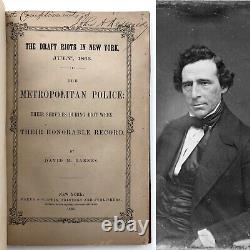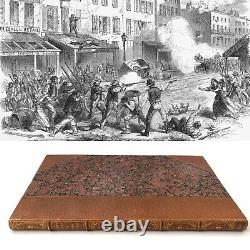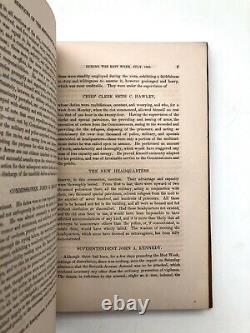
- Homepage
- Binding
- 1 / 2 Leather (2)
- 3 / 4 Leather (2)
- Brochure / Pamphlet (4)
- Cloth (87)
- Disbound (3)
- Fine Binding (52)
- Hard Back (2)
- Hard Cover (4)
- Hardback (6)
- Hardcover (893)
- Hardcover Sheepskin (2)
- Hardcover W / Jacket (5)
- Hardcovers (2)
- Leather (259)
- Original Blue Cloth (2)
- Quarter Leather (3)
- Softcover (3)
- Softcover, Wraps (42)
- ... (3553)
- Language
- Region
- Subject
- American History (7)
- Americana (79)
- Art & Photography (7)
- Bible (12)
- Children's (4)
- Civil War (60)
- Exploration & Travel (5)
- Fashion & Costumes (4)
- Figures & Portraits (19)
- Historic & Vintage (10)
- History (255)
- Illustrated (7)
- Literature & Fiction (37)
- Men, Civil War (8)
- Military (20)
- Military & Political (131)
- Military & War (644)
- New York (4)
- Reference (19)
- Science & Medicine (8)
- ... (3586)
- Topic
- American (us) (22)
- American Civil War (14)
- American History (4)
- Atlases (4)
- Bible (5)
- Christianity, Bibles (97)
- Christmas (4)
- Civil War (50)
- Civil War (1861-65) (894)
- Classics (6)
- Essays & Speeches (3)
- Grant (3)
- Historical (34)
- Literature (5)
- Military (24)
- Plantation Life (6)
- Religion (6)
- The Civil War (4)
- U.s. Grant (13)
- United States (30)
- ... (3698)
- Year Printed
The Draft Riots in New York, July, 1863, Civil War, History, Rare, Lincoln, Race





The Draft Riots in New York, July, 1863. The Metropolitan Police, Their Services during the Riot Week.
First edition of the key contemporary account of the largest riot in American history - presentation copy from the Superintendent of the New York City Police, John A. The 59-year old superintendent was savagely beaten and stabbed by a mob at the city's draft office. Stylishly bound without the rear wrapper by the excellent turn of the century New York bindery, Bradstreet's, in three quarter morocco and marbled boards.
Elaborately gilt tooled spine, top edge gilt. Joints and corners lightly rubbed.
Top edge slightly trimmed, front wrapper margins lightly rubbed, one small spot on title page, fore-edge, and a few trivial sporadic ones, otherwise remarkably clean and crisp pages throughout - Fine. Published just 2 months after the events of madness, the volume is drawn from police reports, New York Times articles, and eyewitness testimony. Utterly scarce - I've seen just a couple in the trade and two in sales records during the last 100 years - none with any provenance, let alone one of this magnitude. With the passage of draft laws, the bubbling cauldron of economic and racial animus overflowed. On the morning of Monday, July 13, 1863, thousands of white workers in Manhattan erupted in what's still the deadliest rioting in American history.
Mobs rampaged through most of the week in an orgy of savage murder, arson and looting. They hung black men from lampposts and dragged their mutilated bodies through the streets. They beat and murdered the pitifully small squads of policemen and soldiers the city initially mustered-and grotesquely defiled their corpses as well. It took federal troops to start restoring order to burning, rubble-strewn Manhattan that Thursday.
The published death count was 119, but many New Yorkers believed the actual toll was hundreds more. The immediate spark of the uprising was the start of conscription into the Union army that Saturday, July 11, when the names of 1,236 New Yorkers were pulled from a wooden drum, nicknamed "the wheel of misfortune, " in the draft office at East 46th Street and Third Avenue. The rioting on Monday started there and fanned out. The event has gone down in history as "the draft riots, " but trouble had been brewing long before the draft began.In the decades preceding the war, large numbers of New Yorkers-workers, businessmen, bankers, newspaper editors and politicians-had been adamantly pro-South and pro-slavery. Long after slavery was abolished in the state of New York, the city's economy was as dependent on it as any plantation owner was. The gigantic international trade in Southern cotton was the key.
New York banks financed the spread of cotton plantations across the Deep South. The city's hotels, restaurants and entertainment venues filled up every summer with Southern visitors. So much of New York's business community had no desire to end slavery. Meanwhile, opportunistic newspaper editors and demagogic politicians kept the workers in fear that the end of slavery in the South would flood the city with cheap competition for their jobs.
A sharp recession and widespread unemployment in 1857 deepened their anxieties. Not surprisingly, then, many New Yorkers were hostile to Abraham Lincoln. Like their Southern business partners, they were convinced he would move to abolish slavery, despite his repeated assurances to the contrary. New Yorkers voted two to one against him in 1860. When Southern states started to leave the Union after Lincoln's election, the city's business community begged their clients not to go.
Mayor Ferdinand Wood seriously suggested that the city should secede along with them. When war came in the spring of 1861, thousands of New York workers signed up to join the fight, lured by the prospects of a weekly pay packet as well as a short, glorious adventure. Two years of carnage on the battlefield reduced the volunteerism to a trickle. When Lincoln issued his Preliminary Emancipation Proclamation in September 1862, New York workers launched protests, while soldiers and officers in New York units deserted or resigned their commissions, declaring that they'd fight to preserve the Union but not to free the slaves. The workers had other complaints.
For all their worrying beforehand, New York businessmen soon figured out how to make huge profits from the war, giving rise to a showy new class of millionaires, the shoddy aristocracy. But workers' wages stagnated, while the price of necessities soared because of wartime inflation. A year of protests, often including racial violence, preceded the July riots.
That was the average worker's annual pay. Protesting that it had become "the rich man's war but the poor man's fight, " the workers erupted.
Thus the "draft riots" were actually an expression of rage and fear on multiple levels. An entire sector of the white population, with grievances real and imagined, lashed out in a revolt that was a deadly mix of misplaced racial hatred, economic insecurity, and class warfare. Though it was more than 150 years ago, there may still be lessons to draw, given the ample evidence in recent years and even days of a racial divide as wide and deadly as ever.
(John Strausbaugh, White Riot: Why the New York Draft Riots of 1863 Matter Today). This item is in the category "Books & Magazines\Antiquarian & Collectible".ox1ve" and is located in this country: US. This item can be shipped worldwide.
- Binding: Hardcover
- Place of Publication: New York
- Language: English
- Special Attributes: 1st Edition, Inscribed
- Region: North America
- Author: David Barnes
- Country/Region of Manufacture: United States
- Topic: American (US)
- Subject: History
- Year Printed: 1863
- Original/Facsimile: Original

